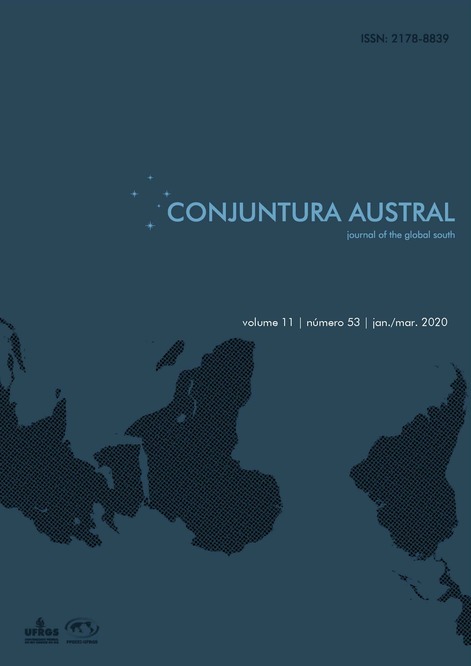The place of renewable sources in Brazil's relationship with “RICS” in the energy area: an analysis of bilateral agenda and summit declarations (1990-2018)
DOI:
https://doi.org/10.22456/2178-8839.97553Keywords:
Brazil, BRICS, Renewable energyAbstract
This paper discusses the energy reality within the BRICS, with special attention to renewable energies. From this perspective, Brazil emerges with a prominent role in the coalition, being considered one of the most decarbonized countries in the world, a pioneer in bioenergy and one of the global leaders in wind and
hydroelectric generation. On the other hand, coal occupies a considerable space in the energy matrix of South Africa, China and India. In addition, the has the largest crude oil producer in the world: Russia. Taking into consideration the potential and challenges of each country regarding this matter, this research is structured around two main axes: to evaluate how renewable sources permeate the bilateral agreements signed by Brazil in the area of energy with the “RICS”; and understand how the debate is characterized in the summits joint declarations. The methodology used involved the construction of an original database, as well as the application of descriptive statistics and content analysis techniques. The results indicate that China and Russia dominate Brazil's bilateral energy agenda with the RICS and that the Lula administration has been, since the redemocratization, the most active in terms of the number of International energy acts signed with these partners. The findings also indicate some points of intersection between the bilateral agenda and the joint positions adopted in the summit declarations, although there was no increase in energy agreements after the establishment of the BRICS.
Downloads
Downloads
Published
How to Cite
Issue
Section
License
Authors who publish with this journal agree to the following terms:
a. Authors retain the copyright and grant the journal the right to first publication, with the work simultaneously licensed under the Creative Commons Attribution-Non Commercial-ShareAlike 4.0 International License, which allows its use, distribution and reproduction in any medium, as well as its transformation and creations from it, as long as the original author and source are credited. Also, the material cannot be used for commercial purposes, and if it is transformed, or used as a basis for other creations, these must be distributed under the same license as the original.
b. Authors are able to enter into separate, additional contractual arrangements for the non-exclusive distribution of the journal's published version of the work (e.g., post it to an institutional repository or publish it in a book), with an acknowledgment of its initial publication in this journal.
c. Authors are allowed to deposit, in the repositories accepted by Conjuntura Austral, the preprint version of the manuscripts submitted to the journal prior to and during the submission process, as it can lead to productive exchanges, as well as earlier and greater citation of published work (See The Effect of Open Access)
d. Authors are permitted and encouraged to publish and distribute online (in institutional and /or thematic repositories, on their personal pages, etc.) the postprint version of the manuscripts (accepted and published), without an embargo period.
e. Conjuntura Austral: Journal of the Global South, imbued with the spirit of ensuring the protection of regional academic and scientific production in Open Access, is a signatory to the Mexico Declaration on the use of the Creative Commons BY-NC-SA license to guarantee the protection of academic and scientific production in open access.








